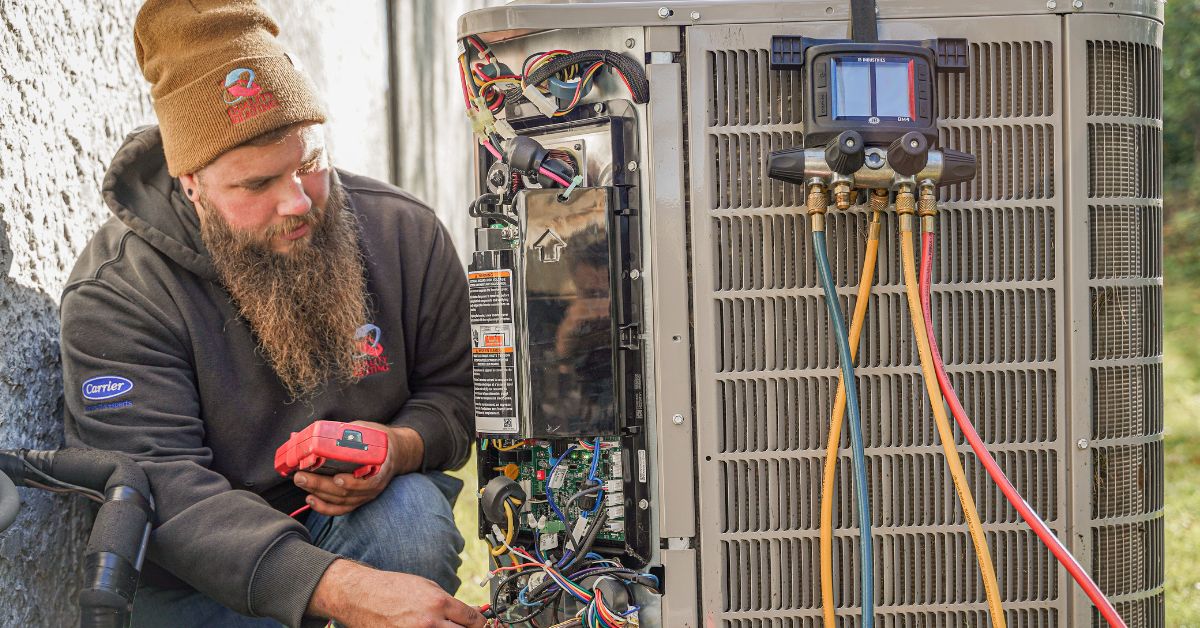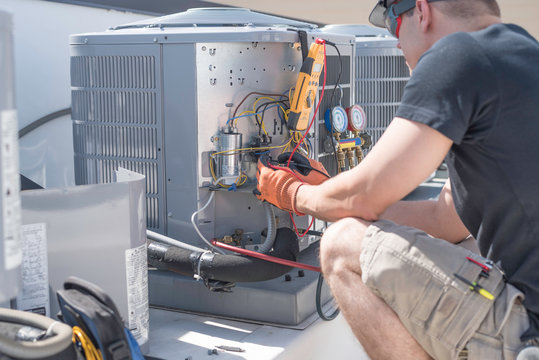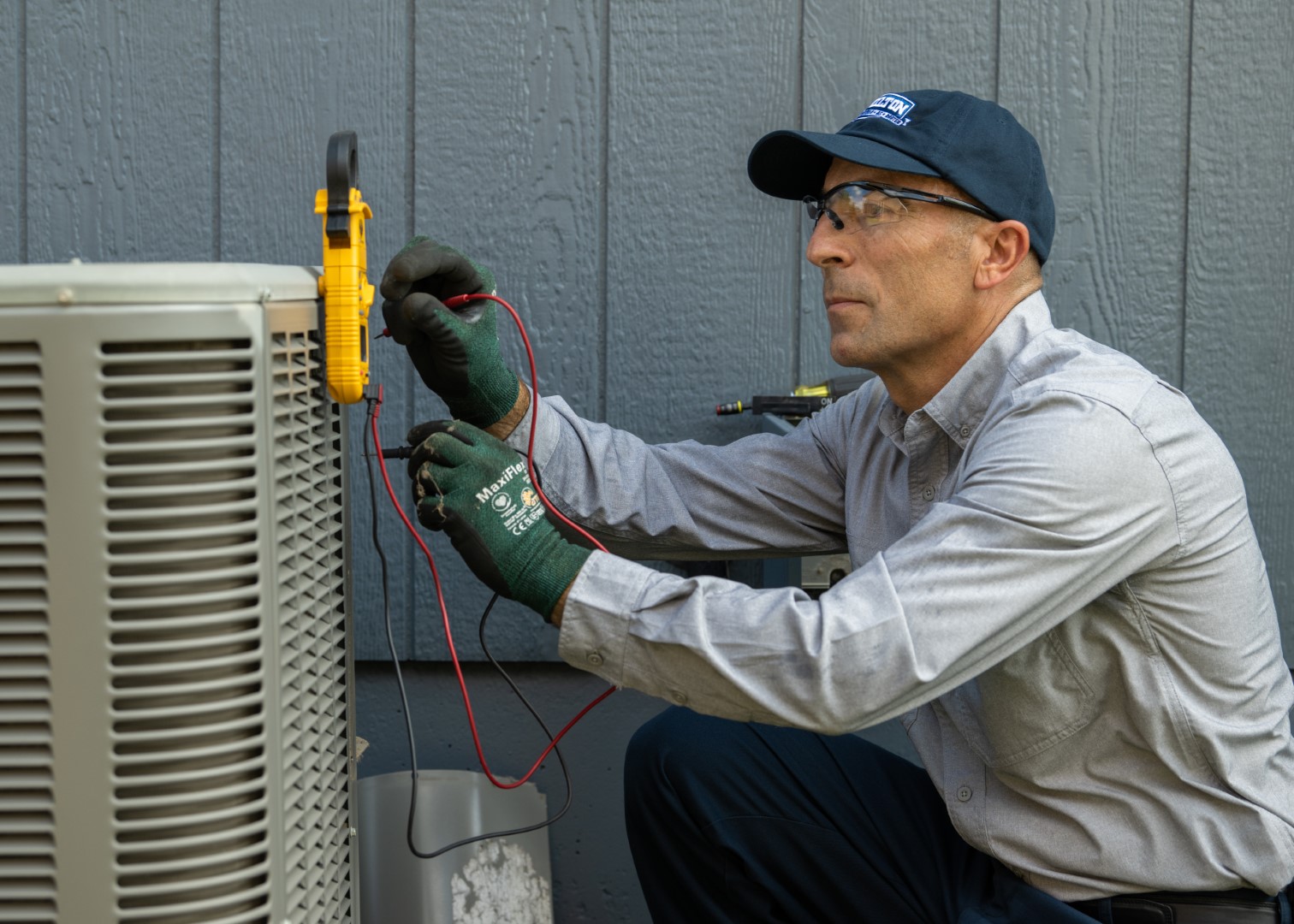AC repairman checklist: ways to avoid breakdowns
Wiki Article
All About A/c: Identifying Common Issues and Effective Air Conditioner Repair Approaches
Cooling and heating systems are vital for preserving interior comfort. Comprehending their elements and functionality is crucial for identifying common problems. House owners frequently encounter issues such as inefficient air conditioning, odd odors, or increasing power costs. These signs can suggest underlying issues that might call for focus. Exploring DIY troubleshooting techniques can be advantageous, but knowing when to look for expert assistance is similarly crucial. What actions can be taken to guarantee resilient efficiency?Understanding Your Cooling And Heating System: Parts and Capability
A heating and cooling system, typically taken into consideration the foundation of interior environment control, includes a number of key components that interact to control temperature level and air quality. The main components consist of the home heating unit, air flow system, and cooling device. The heating device, normally a heater or central heating boiler, generates heat throughout colder months, while the cooling unit cools down interior spaces throughout the summertime.
Typical Heating And Cooling Problems Home Owners Experience
House owners typically deal with numerous common a/c problems, including inconsistent temperature level distribution throughout their space. Additionally, uncommon noises during operation can indicate underlying concerns that call for attention. Dealing with these worries immediately is vital for maintaining suitable system efficiency.Inconsistent Temperature Distribution
Several households experience the frustrating problem of irregular temperature level distribution, where particular rooms feel annoyingly cozy while others stay too cool. This problem commonly occurs from a variety of aspects, consisting of inadequate insulation, obstructed vents, or an incorrectly sized cooling and heating system. When ducts are not adequately sealed or when furnishings obstructs airflow, some spaces may obtain insufficient cooling. Additionally, thermostat placement can substantially impact temperature level regulation; a thermostat situated in a sunlit area might misstate the overall temperature of the house. Normal maintenance, including cleansing filters and ensuring ductwork is clear, can assist alleviate these inconsistencies. House owners might also think about zoning systems to better control temperature levels throughout different locations of the home, advertising a more comfortable living setting.Uncommon Sounds Throughout Operation
When a HVAC system runs, unusual sounds can suggest underlying concerns that need attention. Home owners might encounter a series of audios, such as grinding, squealing, or hissing. Grinding noises typically signal damaged bearings or parts, while squealing can suggest loosened belts or components requiring lubrication. Hissing might suggest a cooling agent leak, which can jeopardize the system's performance. Additionally, banging audios could point to loosened ductwork or a concern with the blower fan. Each of these sounds works as a caution, triggering house owners to check out even more. Ignoring these indications can lead to even more considerable troubles and pricey repair services. Routine upkeep and prompt attention to uncommon sounds can boost system durability and performance, ensuring a comfortable living environment.Indicators That Indicate Your AC Requirements Repair Service
How can one inform if their a/c unit needs repair service? A number of signs might indicate underlying problems requiring expert interest. If the Air conditioning stops working to cool down the space efficiently, it may recommend a cooling agent leak or compressor breakdown. Additionally, a boost in energy expenses without corresponding usage modifications could signal inefficiency in the system. House owners need to likewise look out to uncommon smells emanating from the device, which might suggest mold and mildew growth or electric problems. If the Air conditioner frequently cycles on and off, it could be an indication of a damaged thermostat or other mechanical troubles. The presence of water pooling around the device can suggest a stopped up drainpipe line. Identifying these indications early can conserve money and time, making sure that the cooling system operates successfully and properly.Do It Yourself Troubleshooting Techniques for Cooling And Heating Issues
When encountering HVAC concerns, home owners can utilize numerous DIY fixing techniques to determine the problem. Trick methods include checking thermostat settings, evaluating air filters, and assessing water drainage issues. These actions can aid pinpoint usual malfunctions prior to looking for expert support.Checking Thermostat Setups
What steps should homeowners require to guarantee their thermostat settings are appropriate? They ought to verify the thermostat is set to the wanted temperature level and mode, whether home heating or cooling. Looking for a clear display and confirming the thermostat is not set to "hold" or "vacation" mode is necessary. Home owners need to additionally validate that the thermostat is degree and set up in an area devoid of drafts, direct sunlight, or various other temperature level influences. In addition, altering the thermostat can help supply exact analyses. If the thermostat operates batteries, replacing them may resolve any problems. By methodically assessing these factors, homeowners can usually identify and fix thermostat-related problems, promoting optimal heating and cooling system performance.Inspecting Air Filters
Air filters play an essential function in keeping perfect cooling and heating efficiency. They catch dirt, allergens, and various other fragments, guaranteeing clean air blood circulation. Gradually, filters can come to be blocked, decreasing airflow and efficiency. To check air filters, individuals ought to first find the filter, usually located in the return duct or near the heating system. When situated, they ought to review the filter's problem-- if it appears filthy or blemished, it most likely needs substitute. Many filters call for altering every 1-3 months, depending upon usage and ecological variables. Regular assessment and timely replacement of air filters not only improve air quality but additionally lengthen the lifespan of a/c systems, preventing prospective malfunctions and pricey repairs.
Evaluating Drain Issues
Exactly how can house owners efficiently identify and deal with water drainage concerns within their HVAC systems? First, they need to examine the condensate drainpipe line for blockages or blockages, which can lead to water accumulation. Home owners might utilize a wet/dry vacuum to clear any debris obstructing the line. Next, examining the drainpipe pan for rust or leaks is essential, as a harmed frying pan can trigger water to overflow. Routine cleaning of the drain line with a blend of vinegar and water assists avoid future obstructions. In addition, guaranteeing appropriate slope of the drain line promotes effective water circulation. If these do it yourself strategies do not deal with the concern, consulting an expert HVAC technician might be necessary to prevent prospective water damage and system failure.When to Call a Specialist for Air Conditioner Fixings

While some air conditioner problems can be dealt with via do it yourself techniques, there are situations where calling a specialist comes to be essential. Home owners should look for expert aid when they come across consistent troubles, such as poor cooling, odd sounds, or unusual odors originating from the device. These symptoms might suggest deeper concerns that need specialized understanding and devices to diagnose and fix correctly.

Preventative Upkeep Tips for Cooling And Heating Durability
Regular preventative maintenance can substantially boost the longevity of heating and cooling systems. Home owners need to schedule yearly examinations by licensed specialists to examine system efficiency and determine possible issues. Regularly changing or cleaning up air filters is vital, as this warranties appropriate airflow and reduces strain on the system. On top of that, checking and sealing ductwork avoids energy loss and improves total efficiency.
It is likewise advisable to keep the exterior device free from particles and plants, permitting peak air flow and heat exchange. House owners must check the condensate drain for clogs to stay clear of water damages and mold development. Furthermore, keeping suitable thermostat settings and making use of programmable choices can improve energy effectiveness. Documenting maintenance tasks assists track service history and can assist in determining repeating concerns. By adhering to these preventative procedures, individuals can make the most of the efficiency and life-span of their HVAC systems
Frequently Asked Questions
Just how Usually Should I Replace My A/c System Filters?
Heating and cooling system filters need to commonly be replaced every one to three months, depending upon use, filter type, and ecological elements. Regular replacement aids keep efficiency and air quality, making sure peak system efficiency throughout the year.What Size A/c System Do I Required for My Home?
To identify the appropriate HVAC system size for a home, one must consider square video, insulation top quality, ac unit replacement and local climate. Consulting a professional can aid assure optimal performance and comfort for the specific living room.Exist Eco-Friendly Cooling And Heating Options Available?
Yes, green cooling and heating alternatives are offered, including energy-efficient heatpump, solar-powered systems, and geothermal heating. These alternatives minimize power consumption and ecological effect, promoting sustainability while maintaining efficient climate control for household and business rooms.How Can I Boost My heating and cooling System's Energy Efficiency?
To boost HVAC power efficiency, one can routinely maintain the system, seal air leaks, mount programmable thermostats, utilize energy-efficient filters, and assurance ample insulation throughout the home to lower energy intake and improve efficiency.
What Is the Typical Life Expectancy of an A/c System?
The average life expectancy of a HVAC system normally varies from 15 to 25 years, relying on elements such as maintenance, use, and the top quality of setup. Normal maintenance can considerably expand its operational long life.Conclusion
In summary, a detailed understanding of HVAC systems empowers homeowners to determine common problems and address small problems successfully. Identifying signs of breakdown, employing DIY fixing strategies, and prioritizing routine upkeep can enhance system performance and performance. When encountered with complex repair services, getting professional help is critical to ensure security and long life. By promoting awareness and positive treatment, individuals can appreciate a comfy interior environment while reducing unexpected prices connected with HVAC failings.Report this wiki page